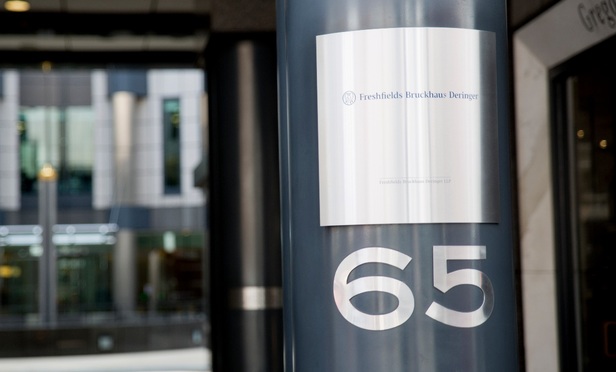Freshfields slips behind Linklaters by revenue and PEP following 'challenging' 2016-17
Revenue grows by less than one percent while net profit falls
July 03, 2017 at 10:59 AM
4 minute read

Freshfields Bruckhaus Deringer has been outpaced by magic circle rival Linklaters in both revenue and profitability, announcing stagnant turnover and shrinking net profit for 2016-17.
The firm posted revenue of £1.33bn for 2016-17, a marginal increase of just 0.3% on the previous year, while net profit fell by just under 1% to £612m.
Despite the fall in net profit, average profit per equity partner (PEP) grew by 5% to £1.547m. The firm had approximately 395.6 equity partners in 2016-17, compared with 419 in 2015-16, a fall of 5.9%.
Freshfields' performance means Linklaters has edged ahead of it by both revenue and PEP, after Linklaters posted strong financial results for 2016-17, with turnover climbing by almost 10% to £1.44bn and PEP climbing by 7.8% to £1.568m.
Freshfields is largely an all-equity partnership, whereas Linklaters reports a PEP figure and a profit per partner figure. Linklaters' profit per partner number this year stood at £1.476m, up 7.9% from £1.368m last year.
Last year, Freshfields reported a 6.6% increase in revenue to £1.327bn against a 7.5% increase in profit to £617m, with PEP growing by a similar amount to £1.473m.
Freshfields joint managing partner Stephan Eilers said: "We had a challenging year, especially on the revenue line, but we are broadly satisfied with the outcome."
Eilers said the lack of revenue growth was down to a variety of reasons.
"On the revenue line, we cannot track in detail how these things develop in our size of business – this year we lost quite a number of partners in the upper age bracket, both through normal retirement and others leaving such as [corporate rainmaker] Mark Rawlinson joining Morgan Stanley," he said.
Eilers also attributed some of the lack of revenue growth to conflicts issues and the proposed merger of Deutsche Boerse and Freshfields' client the London Stock Exchange falling through.
He added that the firm had also invested in certain areas including its Manchester legal and business services centre, which is now close to a headcount of 600, and its US offices.
The fall in profit was down to the lack of revenue growth, according to Eilers.
"If we had revenue growth the profit number would look different. If the revenue had been higher the profit number would be different, as the cost structure would be the same," he said.
Many firms have reported significant increases in revenue and PEP, with those with large international presences benefiting from an uplift due to the falling value of the pound.
While it may not have seen the same percentage gains in its performance, Freshfields did benefit from currency fluctuations.
If its 2015-16 results were re-calculated using exchange rates for this year rather than last, the firm's revenue would have shrunk by 5.4% from a revised figure of £1.406bn, with PEP falling by more than 1% from a revised figure of £1.571m.
Freshfields' results come as the firm has taken a number of steps to boost profitability across the firm, with a number of partners and staff leaving as a consequence.
The firm has restructured its finance practice, seen partner numbers in Germany reduce by 20% since 2015, with a further 20% decline in partner count expected by 2020, and closed an office in Cologne.
It has also offered redundancy to all 180 of its London secretarial staff, offering the choice of voluntary redundancy, application for an executive assistant role or staying in their current roles, and moved a number of jobs from London to Manchester where it is building a large support centre.
Eilers commented: "We have had a solid year in spite of challenging market conditions. Our trajectory continues to be positive as we support our clients in delivering some of the most significant work in the market."
This content has been archived. It is available through our partners, LexisNexis® and Bloomberg Law.
To view this content, please continue to their sites.
Not a Lexis Subscriber?
Subscribe Now
Not a Bloomberg Law Subscriber?
Subscribe Now
NOT FOR REPRINT
© 2025 ALM Global, LLC, All Rights Reserved. Request academic re-use from www.copyright.com. All other uses, submit a request to [email protected]. For more information visit Asset & Logo Licensing.
You Might Like
View All
Goodwin's Singapore Private Equity Partner Leaves to Join Key Client Hillhouse Investment


Trending Stories
- 1Supreme Court Considers Reviving Lawsuit Over Fatal Traffic Stop Shooting
- 2Long Hours and Lack Of Boundaries: Associates In India Are Leaving Their Firms
- 3Goodwin Procter Relocates to Renewable-Powered Office in San Francisco’s Financial District
- 4'Didn't Notice Patient Wasn't Breathing': $13.7M Verdict Against Anesthesiologists
- 5'Astronomical' Interest Rates: $1B Settlement to Resolve Allegations of 'Predatory' Lending Cancels $534M in Small-Business Debts
Who Got The Work
J. Brugh Lower of Gibbons has entered an appearance for industrial equipment supplier Devco Corporation in a pending trademark infringement lawsuit. The suit, accusing the defendant of selling knock-off Graco products, was filed Dec. 18 in New Jersey District Court by Rivkin Radler on behalf of Graco Inc. and Graco Minnesota. The case, assigned to U.S. District Judge Zahid N. Quraishi, is 3:24-cv-11294, Graco Inc. et al v. Devco Corporation.
Who Got The Work
Rebecca Maller-Stein and Kent A. Yalowitz of Arnold & Porter Kaye Scholer have entered their appearances for Hanaco Venture Capital and its executives, Lior Prosor and David Frankel, in a pending securities lawsuit. The action, filed on Dec. 24 in New York Southern District Court by Zell, Aron & Co. on behalf of Goldeneye Advisors, accuses the defendants of negligently and fraudulently managing the plaintiff's $1 million investment. The case, assigned to U.S. District Judge Vernon S. Broderick, is 1:24-cv-09918, Goldeneye Advisors, LLC v. Hanaco Venture Capital, Ltd. et al.
Who Got The Work
Attorneys from A&O Shearman has stepped in as defense counsel for Toronto-Dominion Bank and other defendants in a pending securities class action. The suit, filed Dec. 11 in New York Southern District Court by Bleichmar Fonti & Auld, accuses the defendants of concealing the bank's 'pervasive' deficiencies in regards to its compliance with the Bank Secrecy Act and the quality of its anti-money laundering controls. The case, assigned to U.S. District Judge Arun Subramanian, is 1:24-cv-09445, Gonzalez v. The Toronto-Dominion Bank et al.
Who Got The Work
Crown Castle International, a Pennsylvania company providing shared communications infrastructure, has turned to Luke D. Wolf of Gordon Rees Scully Mansukhani to fend off a pending breach-of-contract lawsuit. The court action, filed Nov. 25 in Michigan Eastern District Court by Hooper Hathaway PC on behalf of The Town Residences LLC, accuses Crown Castle of failing to transfer approximately $30,000 in utility payments from T-Mobile in breach of a roof-top lease and assignment agreement. The case, assigned to U.S. District Judge Susan K. Declercq, is 2:24-cv-13131, The Town Residences LLC v. T-Mobile US, Inc. et al.
Who Got The Work
Wilfred P. Coronato and Daniel M. Schwartz of McCarter & English have stepped in as defense counsel to Electrolux Home Products Inc. in a pending product liability lawsuit. The court action, filed Nov. 26 in New York Eastern District Court by Poulos Lopiccolo PC and Nagel Rice LLP on behalf of David Stern, alleges that the defendant's refrigerators’ drawers and shelving repeatedly break and fall apart within months after purchase. The case, assigned to U.S. District Judge Joan M. Azrack, is 2:24-cv-08204, Stern v. Electrolux Home Products, Inc.
Featured Firms
Law Offices of Gary Martin Hays & Associates, P.C.
(470) 294-1674
Law Offices of Mark E. Salomone
(857) 444-6468
Smith & Hassler
(713) 739-1250









